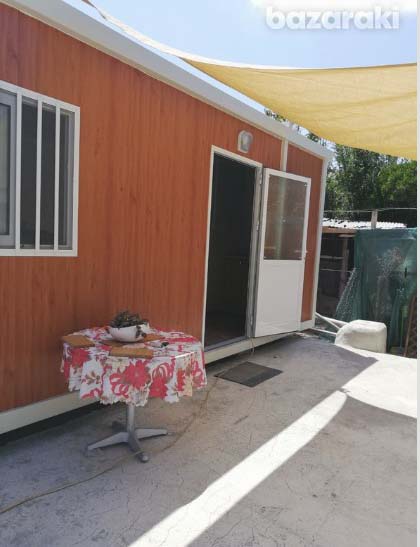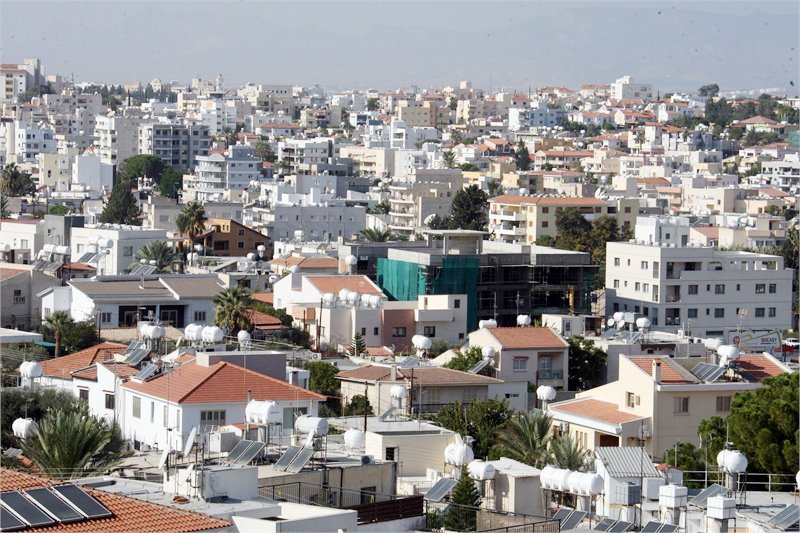Cheapest rent in Nicosia is €300 for 30 square metre container-like room in Lakatamia
By Nick Theodoulou
Rents are up by 50 per cent in some areas – and not just in Limassol – with some students in Nicosia now renting cheaper apartments in the north. The Sunday Mail spoke to experts in the real estate sector who explained the factors which are leading to higher prices – and they argue that they are all heading in one direction: up and up.
The cheapest available place to rent on Bazaraki – a popular site for those seeking accommodation – is for €300, which gets you a 30 square metre prefab container-like room in Lakatamia, Nicosia. Another for €300, also a prefab container home, is available in Kornos.
Yiannos Andreou, 32, told the Sunday Mail that four years ago he was renting a one-bedroom apartment along a busy street in Ayios Dhometios in the capital for €300 but it has since increased to €420.
Experts we spoke to told us that despite the increase the tenant has snagged a bargain.
“Rents have shot up, that’s mainly due to more people moving to Cyprus,” Pavlos Loizou, CEO of AskWire – a property technology company, which provides real estate data analytics, told the Sunday Mail.
Indicative prices for a one-bedroom apartment in Nicosia are at about €500 – €600 while in Limassol they stand at around €800 – €900, according to Marinos Kineyirou, president of the Council for Registration of Real Estate Agents.
For Larnaca the rent for a single bedroom apartment is about €400 – €500 while in Paphos it’s at €350 – €450 – and rising.
And while the focus of the price rises in housing has long been on Limassol, every district is recording a surge.
“Rents have doubled in some cases over the past three years,” head of the real estate agent’s association (Skek) Andreas Kaouris told the Sunday Mail.
He emphasised: “We’re seeing astronomical rents, and I don’t see this changing anytime soon.”
Kaouris told us that the equilibrium in the market has been thrown off, as “the rents are so high in Limassol which pushes more people towards Paphos, Larnaca, and Famagusta where the rents are cheaper in comparison to Limassol”.

Weak rental regulation – viewed by landlords as strongly favouring those renting – means that landlords are often hesitant to rent
According to Paphos Chamber of Commerce president George Mais, the limited number of rental properties in the city is pushing prices higher, with prices up by as much as 30-50 per cent.
Pointing to the surge in demand for accommodation, Loizou cited the most recent census which showed that from 2011 to 2021 the population increased by about 85,000 people.
“And so far in 2022 – there’s no official numbers, yet – but we’re likely at about 20,000 and rising in terms of new arrivals,” he said, explaining that they are mainly on the higher end of the market.
Those involved in the real estate market told the Sunday Mail that there are a multitude of factors which impact the sector – most of which are pointing in the direction of pushing prices higher.
They focused on Russia’s invasion of Ukraine which has had the double effect of pushing up construction costs due to energy price shocks as well as an increase in people seeking refuge – further boosting demand for accommodation.
Indeed, Kaouris sees property as a safe investment as construction costs have also surged – meaning that home prices are unlikely to decrease during a potential upcoming crisis.
He also cited the arrivals in Cyprus because of the Russian invasion, as well as high levels of irregular immigration which has led to a surge in demand for lower end accommodation, pushing up prices there, too.
Loizou explained that many legal foreign workers arriving in the coastal cities are providing much needed skills, mainly in the IT sector.
Many view this as a simply supply and demand issue: there’s just more people seeking accommodation than is available.
Kaouris said that housing is also viewed as a safe investment during a time of low return on interest rates and inflation, rather than saving money in the banks.
“Many Cypriots – not the big time investors but the smaller ones – have taken their money out of the banks and whoever had enough money has purchased an apartment, not fields, and then rent it out,” he said.
For Loizou, another factor which will keep rents rising is the rising interest rates.
“As interest rates increase, those who are renting and were considering a purchase are now likely to postpone it – so by remaining in the rental pool they are withholding one house or apartment being made available for rent, compounding demand,” he said.
Loizou doesn’t see prices falling any time soon, either, explaining that overseas investors and workers are likely to offset a possible drop in demand from the locals.
“I don’t see prices coming down, and the reason for that is that even if there’s a softening of demand from locals it will be matched by those from overseas who will move in and buy mainly residential units,” he said.
“Where we may see some rebalancing is mainly where locals buy land to build their houses,” Loizou added.
Other factors are also shifting the equation and increasing demand, such as major projects coming online: the Paphos-Polis highway and the announcement that the Cyprus University of Technology (Tepak) is to establish a school of tourism and hospitality management in Paphos, aimed for completion by 2023. That means many more students will need accommodation in the city.
Loizou said that Larnaca has been gaining momentum for about three years now both because of the nearby Limassol port and marina, while it is also favoured by the Lebanese investors seeking a base for business.
“And then there are those from Israel where prices are high but they do have money and they transact mainly in US dollars which has strengthened against the euro,” he said.
Paphos is more recent he says – noting that it has been picking up pace in the past six months.
Asked whether factors such as chronic congestion towards the cities for work and higher petrol prices may alter the market, Loizou said that there have already been some changes – but not due to hardship.
“You are seeing more apartments being constructed in central city areas but that’s less due to hardship and more related to lifestyle changes: such as younger people not getting married or not having large families,” he said.
Loizou explained that over the past eight to ten years there has been a shift towards smaller units and progressively towards apartments.
Amid the price surge for those renting, there have been calls for “something to be done”.

The 30 metre square space in Lakatamia
For Kineyirou, better regulation of the rental market could lower the costs for both landlords and those leasing.
He argues that weak rental regulation – viewed by landlords as strongly favouring those renting – means that landlords are often hesitant to rent out their properties. They argue that they are insufficiently protected by the law in case of non-payment from the tenants, or tenants simply refuse to agree to a rent increase. Others also raise the rent as they attempt to price-in potentially troublesome tenants who may not pay.
He says that the creation of a register of “bad” tenants who do not honour their rental agreements would soothe the market.
Others, however, have said that such a move is unfeasible and that personal data protection issues may arise.
The situation has led to isolated protests by some student groups, mainly in Limassol, who are warning that they are facing a dire situation: a choice to continue studies or give up and enter the labour market.
The House interior committee also heard this month that some are seeking reprieve from the high rental costs by living in the north. That was confirmed by Dipa MP Alekos Tryfonides who spoke with five Greek Cypriot students who are renting in the north, mainly near the Ayios Dhometios crossing.
The students, mainly from rural communities and other cities, told him that in the north they are able to get a single bedroom apartment for €170 and a two-bedroom apartment for about €200-220.
The House education committee heard this week that a considerable number of students studying in cities away from their home are exiting higher education due to the high rental costs, as well as high fuel costs when commuting.
The Sunday Mail also contacted Elena Kousiou, head of the Cyprus Land Development Organisation (Koag), whose service is tasked with securing affordable housing for low-income and vulnerable groups.
“Certainly, many are struggling now to reoganise their finances to buy a home, so Koag is also looking at affordable rent as well as affordable purchasing,” she told us.
Their focus is on areas near city centres, she told us, so apartment buildings in locations such as Larnaca’s Ayios Nikolaos, in Nicosia’s Kaimakli and Lakatamia, as well as Limassol’s Polemidia
In July 2020, Limassol municipality and Koag announced that “the largest housing project ever undertaken in Cyprus, worth €100m” would take place in Limassol.
Kousiou told us that the project is facing delays, explaining that: “It is underway but since we’re talking about 600 units you can understand that it’s complicated and we don’t want there to be any mistakes.”
She acknowledged that since that project is stalling, the Koag council has decided to proceed with smaller scale housing works which can be carried out more swiftly.
When the major Limassol housing project was announced, Interior Minister Nicos Nouris said that: “This agreement will help normalise housing prices in Cyprus, as well as help low-income families who are struggling with making ends meet.”
But just months later, the citizenship by investment scheme – whose proceeds were intended to help fund the Koag project – was axed.
A finance ministry official told the House interior committee earlier this month that revenues from the casinos may now instead partially fund the project.
For the interior ministry part of the solution is its fast-tracking of building permits – which it has hailed as a success.
It is hoped that the new process – which sees applications sent through the ‘Ippodamos’ government portal – will see more properties come online faster, by cutting red tape and reducing bureaucracy.
Even so, new housing stock may still take years to enter the market and experts agree that demand will continue to outstrip supply.







Click here to change your cookie preferences